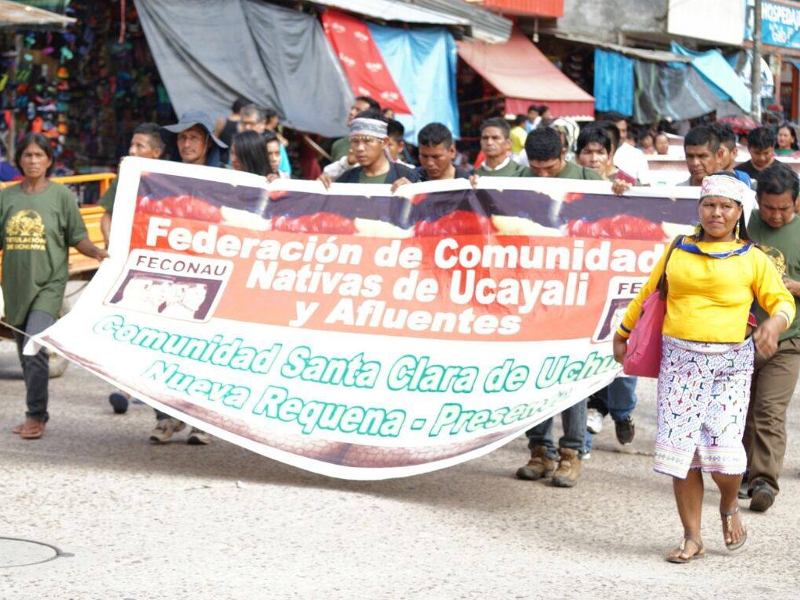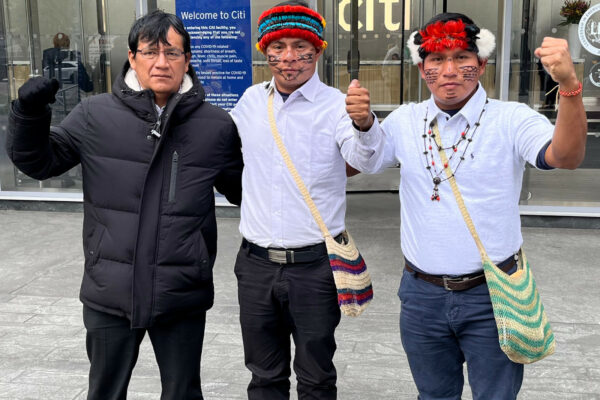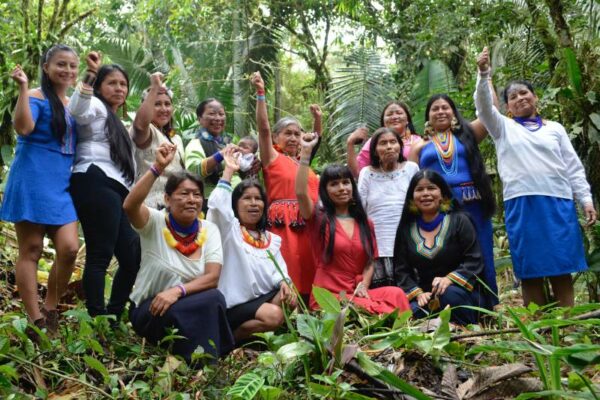
The dusty dirt road to Santa Clara de Uchunya, in the Ucayali region of the Peruvian Amazon, offers a vision of what the world’s largest rainforest might become. Mile after mile, you pass cattle pastures and oil palm plantations on what used to be virgin rainforest. Driving in, you are almost run off the road by hulking dump trucks full of clumps of the African oil palm tree, to be processed into palm oil. Approaching the community, you observe vast areas recently bulldozed flat, leaving nothing but dirt with tracks of heavy machinery. From the perspective of the Shipibo indigenous people, native to this region, this portends a dystopian future.
Last October, I made this journey as part of a delegation organized by our friends at Rainforest Foundation US. The visit was facilitated by Shipibo leader Robert Guimaraes, with whom I had worked in years prior when he was the vice-president of AIDESEP, Peru’s largest indigenous federation. We spent a day visiting the community to get a firsthand sense of their predicament. Community leaders told us about industrial-scale deforestation of their ancestral rainforests and their David-vs-Goliath fight against international investors over who would have legal control of the land.
Unfortunately, many of those same leaders – Robert included – are facing serious risks for speaking up. A January 2017 field mission carried out by researchers from Johns Hopkins University found that, “On multiple occasions [Robert Guimaraes] received anonymous death threats and was pictured on posters around Pucallpa, Ucayali, with the label ‘Persona Non-Grata’ along with other indigenous activists in the area.” As documented by Global Witness, Peru continues to be one of the world’s deadliest countries for activists and indigenous leaders who defend their environment against powerful economic and political interests.
The expansion of oil palm plantations is an emerging threat to the Amazon in Peru and beyond. The rainforests of Indonesia and Malaysia have been devastated by oil palm, a legacy that does not bode well for the Western Hemisphere. And oil palm is not the only culprit – other agricultural products including cattle are large-scale drivers of deforestation and represent threats to the indigenous communities that have made a home of these lands for hundreds if not thousands of years.
This past Monday, June 5th – World Environment Day – indigenous people of Peru’s Ucayali region took to the streets of the capitol city, Ucayali, to once again insist on their rights. At the front of the march were townspeople and leaders from Santa Clara de Uchunya. Their message was simple: Stop the deforestation and stop the threats. They marched for indigenous land titles, starting with Santa Clara de Uchunya, but recognizing that hundreds of indigenous communities should also be titled.
The struggle of Santa Clara de Uchunya is the struggle of indigenous peoples the world over. They confront hostile corporations and a government that openly sides with monied interests. They face death threats for simply standing up for the territory and environment their ancestors knew. With courage and determination they continue on, knowing that the fate of their children depends on it.
Leading up to march on World Environment Day, indigenous federations from around the Ucayali region issued the following statement. The original in Spanish can be found here.
Public Statement
Stop the Harassment Against Environmental and Indigenous Defenders in Ucayali
The undersigned organizations and citizens demand effective measures to stop the systematic harassment to which indigenous organization leaders, townspeople of the Shipibo community of Santa Clara de Uchunya, environmental and human rights defenders of the Ucayali region are being subjected, given their defense of the rainforests and indigenous territories against the expansion of oil palm monocrops, the illegal logging and commercialization of trees, indiscriminate deforestation, and trafficking of land.
As is publically known, the corporations founded by Czech-American investor Dennis Melka have caused deforestation of more than 17,000 hectares of primary rainforest within the provinces of Coronel Portillo and Padre Abad (Ucayali department) and around 3,000 hectares around the town of Tamshiyacu (Loreto department) in order to establish palm oil and cacao plantations, respectively.
In the case of Ucayali, the company named Plantations of Pucallpa (today under the changed name of Ochosur SAC) has faced numerous legal problems for having carried out large-scale deforestation without holding the proper permits. Their project has been sued for taking place within the planned expansion area considered to be ancestral territory to the community of Santa Clara de Uchunya, and more recently, given a formal complaint filed before the Roundtable on Responsible Palm Oil (RSPO), this institution condemned the company for having deforested more than 5000 hectares of Amazon rainforest.
In recent months this socio-environmental conflict has reached worrying levels of tension. Adding to the systematic process of invasions of the communal territory of Santa Clara de Uchunya (within the Nueva Requena district of Coronel Portillo province), there have been verbal and physical threats, in addition to the open practice of stigmatizing community leaders and those with the Federation of Native Communities of Ucayali (FECONAU), through the print and TV media of Pucallpa.
The Regional Government of Ucayali, through their Regional Agriculture Office, has been openly partial in favor of the businesses associated with Dennis Melka and have issued them – through irregular procedures – documentation of possession of areas that the Native Community of Santa Clara de Uchunya are demanding as theirs.
Given that the public institutions are not guaranteeing the rule of law in Ucayali, we are expressing our concern and demand that that Central Government intervene immediately to provide guarantees for the security of the townspeople of Santa Clara de Uchunya, the leaders of FECONAU, and other people dedicated to the defense of the forests within indigenous territories and human rights in Ucayali. In a complete way, the Central Government should intervene administratively given the permanent arbitrary actions associated with the indiscriminate expansion of oil palm in Ucayali. This is an issue to which the government of president PPK has not dedicated the smallest attention.
We have time to avoid this situation getting worse and that we would need to lament, once again, violence in our country, like what happened with the assassination of the indigenous leader Edwin Chota from the Native Community of Saweto in September of 2014 and the lamentable happenings known as the “Baguazo” of June 5th, 2009.
Pucallpa, May 26th 2017
Signed:
ORAU (Organización Regional Aidesep Ucayali)
FECONAU (Federación de Comunidades Nativas y Afluentes del Ucayali)
FECONACURPI (Federación de CC. NN. de la Cuenca del Río Pisqui)
FECONAPIA (Federación de Comunidades Nativas de Puerto Inca y Afluentes)
FECONASHI
FECONBU
ACONADYSH
ORDECONADI
APOCOSHI
FECONAPU













